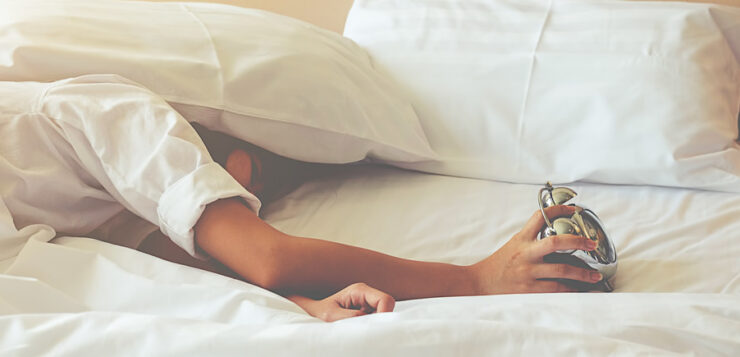When everything got corona-cancelled, one of the few things I looked forward to was more sleep. But turning in earlier and getting up later doesn’t necessarily translate to better rest—not now, not when every person standing too close is a potential threat and every little tickle in your throat is suspect. These are unprecedented times. Without a roadmap as to what the next day holds, many people can’t help but feel anxious—especially at night, when the mind, untethered from the day’s chores, is left alone in the dark to freak out in every direction.
There’s good reason to focus on getting more sleep now, though: Besides being annoying, prolonged periods of poor sleep are bad for your health and immune system; bad sleep can even worsen existing anxiety levels. Fortunately, a range of science-backed strategies, when used alongside good sleep hygiene, can help you rein in your worries so you can sleep soundly. Best of all, these strategies are (for the most part) free.
Slow your breathing. Everybody knows that how you feel affects how you breathe, but how you breathe also ultimately affects how you feel. So when your mind starts to spiral with anxious thoughts, slow your breath to calm your mind. The easiest way to do that is to count your breaths, says Megan Jones Bell, PhD, chief science officer of Headspace, our meditation app pick. Count one on the inhale, two on the exhale, three on the inhale, and so on. “Breathing in through our nose allows us to take in oxygen at a slower and more controlled rate. Exhaling through the mouth allows a greater volume of air to be released, encouraging a quicker state of relaxation,” she says. For more guidance on breathing or to try adding a meditation to your breath exercise, check out Headspace, which has unlocked its Weathering the Storm feature, including two sleep meditations, for everyone. It is also offering a free subscription to health-care professionals who have a National Provider Identifier (NPI) number and work in public-health settings. Calm, another Wirecutter recommendation, also offers select, free features online, including sleep meditations.
Channel nature noises. Spending time in nature—both in urban and wild settings—lowers stress hormones, and research suggests that brain activity shifts into a more relaxed mode even when subjects simply hear nature sounds. In fact, a Brandeis University study found that naturalistic water sounds may lower stress hormones more effectively than music. Of course, the best noises are the ones that sound most relaxing to you. Calm’s free online selection of soundscapes includes “Rain on Leaves.” You’ll also find a wonderful range of options on Sleep Cycle, our runner-up sleep-tracking app pick, which has unlocked its Sleep Aid features “until further notice.”
Write your worries away. Keeping a journal about all that unnerves you can be an effective anti-anxiety hack, and as such, it’s also a helpful sleep tool (just ask Wirecutter contributor Dorie Chevlen). When people commit to spending 10 to 20 minutes writing, they can’t help but touch on possible solutions, says Michael Scullin, PhD, director of the Sleep Neuroscience and Cognition Laboratory at Baylor University in Waco, Texas. But what might be even more helpful, according to Scullin’s 2017 study, is spending five minutes writing a to-do list. “Going through this process, people often realize that things are not as stark as they thought,” he says. This is because “things are less scary when you go into the next day with a plan.” (Even if that plan is just calling Mom at 9, grooming the dog at 3, and scheduling virtual drinks at 5.)
Settle down with a therapeutic workout. Squeezing a workout into your day can reduce anxiety and improve sleep. But if anxiety is still making it hard for you to fall asleep in the first place, an evening session of “gentle, grounding” stretches or restorative yoga might help calm you down, says Wirecutter staff writer and certified personal trainer Ingrid Skjong. She recommends Yoga With Adriene’s 12-minute “Wind-Down Yoga” (video), which guides you through soothing restorative yoga poses and is free on YouTube. Make it a routine, and your mind may learn to ease into sleep mode as your muscles loosen and your breath slows.
Play mind games. I’ve found that counting sheep doesn’t work when I’m awake and worried. It’s too dull. I lose track of what number I’m on. And soon my anxious thoughts overtake my brain again. That’s why Roy Raymann, PhD, chief scientific officer of SleepScore (our sleep-tracking app pick), recommends trying mental activities that are engaging but not too engaging: For example, envision a joyful place, real or imagined. Fill in the picture with as many details as you can; if you’re reminiscing about a day on the ski slope with friends last winter, you might come up with phrases like “the scent of pine,” “powdery snow,” “sunny day,” “my red scarf,” and so on. Guided imagery, which inspires this exercise, has been scientifically shown to improve sleep quality in particularly anxious populations, including dialysis patients and some moms of preterm infants (PDF).
Tally your blessings, both big and small. Researchers have long reported on the mental health benefits of keeping a gratitude journal; one study even suggests that the more thankful you are, the better and faster you might be able to sleep. I’ve found that to be true, too: Deep breathing while mentally listing all that I’m specifically grateful for (my kid’s exuberant laugh, my coffee maker) has an almost magical, lulling effect.

Joanne Chen





